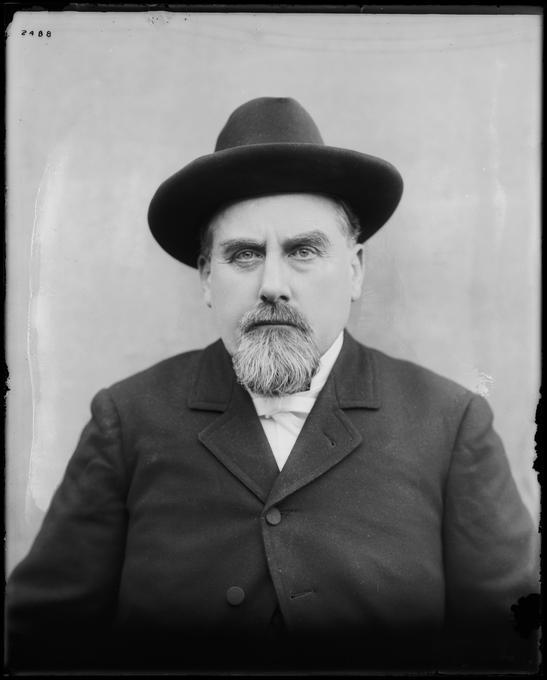Francis Joseph Heney was a California lawyer, judge, and politician during the Progressive era. He was the chief prosecutor of the Oregon Land Fraud trials from 1904 to 1910 and served as U.S. attorney for the District of Oregon from January 9 to December 3, 1905.
Born in Lima, New York, on March 17, 1859, Heney moved with his family to San Francisco at the age of four. He was expelled from the Hastings College of Law in his first year for fighting with a fellow student but went on to pass the California Bar examination in 1883. He then followed his brother Ben to Tucson, Arizona, where he practiced law. In 1891, he shot and killed Dr. John C. Handy, whose wife Heney was representing in a divorce case. An inquest found that Heney acted in self-defense, and he went on to become district attorney of the Arizona Territory for two years. He returned to San Francisco in 1895, where he built a successful private practice.
In 1903, U.S. Attorney General Philander Knox appointed Heney as a special prosecutor in the trial of Stephen Puter, the first of the Oregon Land Fraud Trials. Puter and his accomplices stood charged with conspiracy to defraud the U.S. government through the fraudulent acquisition of timberlands from the public domain. After Puter's conviction in December 1904, Heney and Secret Service detective William J. Burns persuaded him to provide grand jury testimony against several corrupt officials, including Oregon’s U.S. Senator John H. Mitchell and Congressman Binger Hermann, for their part in the frauds. On December 31, 1904, the same day Mitchell and Hermann were indicted, President Theodore Roosevelt removed John H. Hall as the U.S. attorney for the District of Oregon and appointed Heney in his place.
While in Portland, Heney developed a close friendship with U.S. Jury Commissioner C.J. Reed. At Heney's request, President Roosevelt appointed Reed as U.S. marshal to replace Walter "Jack" Matthews, who was implicated in the fraud scandal. Reed's cooperation with Heney met with scorn from the city’s wealthy elite, a fact not lost on his son, journalist John Reed.
Heney gained national attention through his successful prosecution of Senator Mitchell in July 1905 and for his prosecution of San Francisco Mayor Eugene Schmitz and political boss Abe Ruef after the 1906 earthquake. Schmitz and Ruef were accused of accepting bribes in exchange for the awarding of city contracts. During Ruef's sensational trial on November 13, 1908, a disgruntled former juror, Morris Haas, shot Heney in open court. Ruef and Schmitz were both convicted. After recovering from his wound, Heney returned to an active role in the Oregon Land Fraud Trials, prosecuting John Hall in 1908 and Binger Hermann in 1910. Hermann was acquitted, and Hall was later pardoned by President William Howard Taft. In 1908, Heney also actively campaigned against Senator Charles W. Fulton, the only member of the Oregon congressional delegation who was not indicted in 1905. Partly as a result of Heney's accusations that he was complicit in the land frauds, Fulton lost his bid for re-election in 1908.
In 1914, Heney ran for U.S. Senate in California on the Progressive ticket. He lost the election to Democrat James Phelan, a defeat attributed by some to the personal animosity of Governor Hiram Johnson. Heney's career concluded with his appointment as a Los Angeles Superior Court judge in 1931. He died on October 31, 1937, in Santa Monica.
-
![Mitchell land fraud trial cartoon, Oregonian, 1905, by Harry Murphy]()
Mitchell trial, editorial cartoon, 1905.
Mitchell land fraud trial cartoon, Oregonian, 1905, by Harry Murphy Courtesy Oreg. Hist. Soc. Research Library
Related Entries
-
![Binger Hermann (1843-1926)]()
Binger Hermann (1843-1926)
Binger Hermann was a Roseburg attorney and politician who represented O…
-
![John Hipple Mitchell (1835-1905)]()
John Hipple Mitchell (1835-1905)
John Hipple Mitchell was a Portland lawyer and politician whose long ca…
-
![Oregon Land Fraud Trials (1904-1910)]()
Oregon Land Fraud Trials (1904-1910)
During the summer of 1905, while visitors enjoyed the amusements of the…
-
![Stephen Puter (1857-1931)]()
Stephen Puter (1857-1931)
Stephen Puter was the self-described King of the Oregon Land Fraud Ring…
Map This on the Oregon History WayFinder
The Oregon History Wayfinder is an interactive map that identifies significant places, people, and events in Oregon history.
Further Reading
MacColl, E. Kimbark. Merchants, Money, & Power: The Portland Establishment 1843-1913. Portland, Ore.: The Georgian Press, 1988.
Messing, John. "Public Lands, Politics, and Progressives: The Oregon Land Fraud Trials, 1903-1910." Pacific Historical Review 35:1 (1966), 35-66.
Puter, Stephen A. D. and Horace Stevens. Looters of the Public Domain. Portland, Ore.: The Portland Printing House, 1908.






